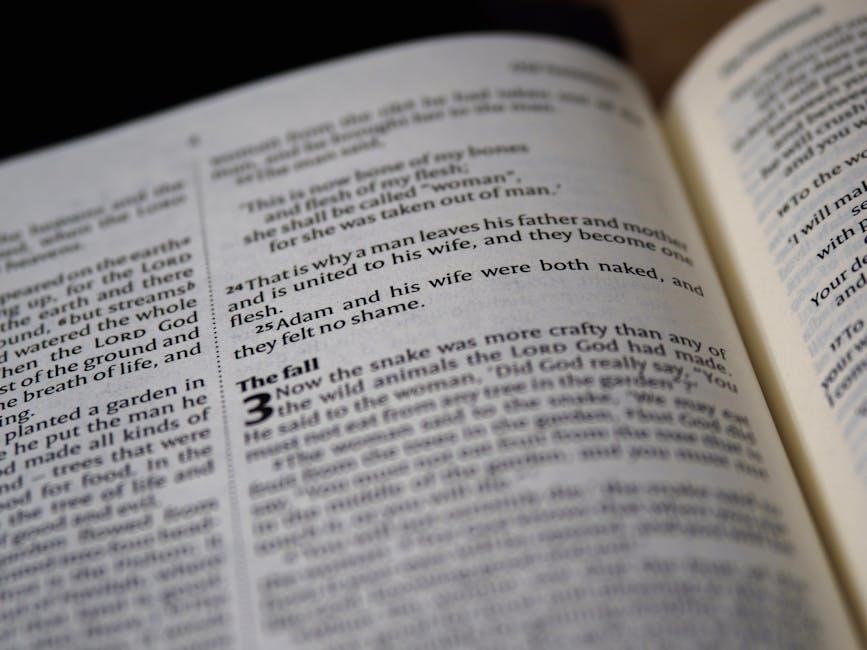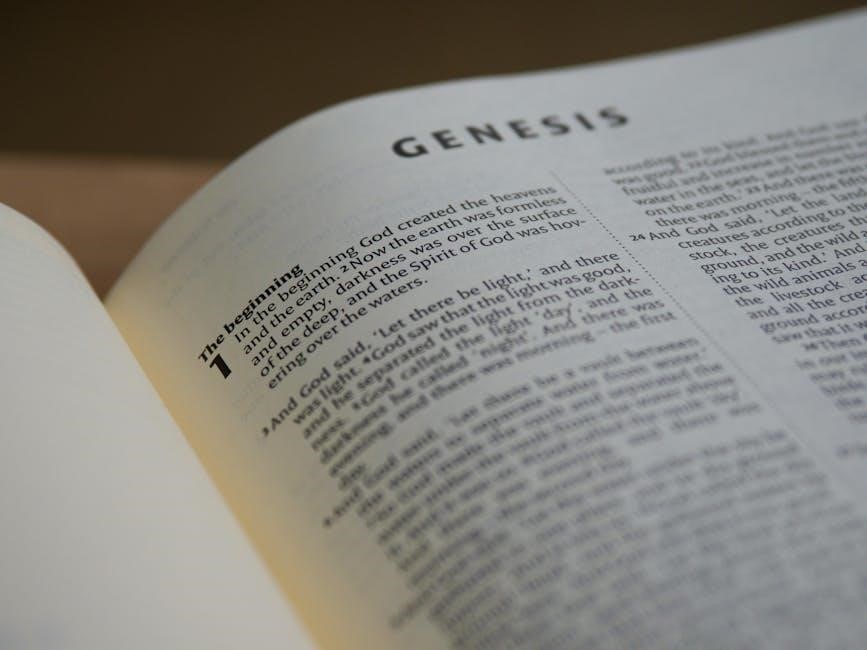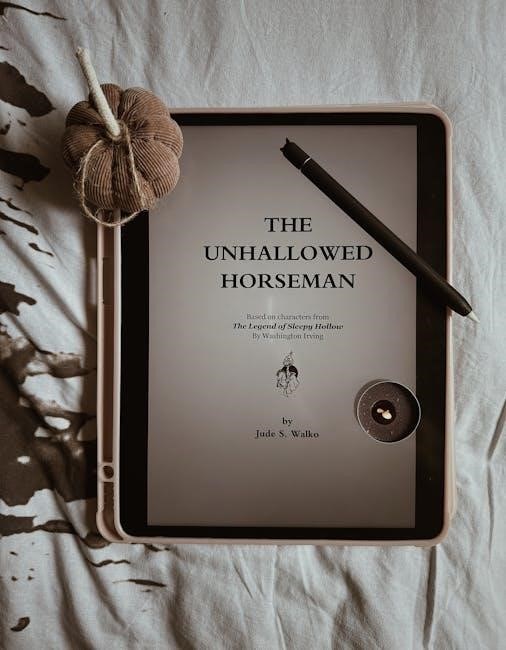The Book of Genesis‚ the first book of the Bible‚ recounts creation‚ humanity’s fall‚ and the origins of Israel. It covers Creation to Joseph‚ establishing redemption’s foundation‚ highlighting God’s faithfulness. It narrates Abraham‚ Isaac‚ Jacob and Joseph’s stories‚ and explores early Earth history.
Overview of Genesis
Genesis‚ meaning “in the beginning‚” serves as the foundational book of the Bible. It unveils God’s redemptive plan and His covenant with humanity. The book begins with the creation of the universe and traces the early history of humankind‚ encompassing events from Adam to Noah. It then narrows its focus to the lineage of Abraham and his descendants: Isaac‚ Jacob‚ and Joseph.

Genesis is divided into two primary sections. The first part (Chapters 1-11) narrates the creation‚ the fall‚ the flood‚ and the Tower of Babel‚ establishing the backdrop for God’s intervention in human history. The latter part (Chapters 12-50) centers on Abraham‚ Isaac‚ Jacob‚ and Joseph‚ recounting God’s promises‚ the establishment of the covenant‚ and the journey of the Israelites into Egypt.
Genesis emphasizes God’s faithfulness despite human sinfulness. Through the stories of these patriarchs‚ Genesis lays the groundwork for understanding God’s redemptive acts throughout the rest of the Bible. It highlights God’s chosen people‚ their struggles‚ and His unwavering commitment to fulfilling His promises.
Creation Account (Genesis 1-2)
The opening chapters of Genesis provide a powerful and poetic account of creation. God speaks‚ and light‚ land‚ sea‚ and sky come into existence. Vegetation flourishes‚ and the sun‚ moon‚ and stars illuminate the heavens. The seas teem with life‚ and birds fill the air. Finally‚ God creates land animals and‚ ultimately‚ humankind‚ made in His own image.
God declares His creation “good‚” culminating in the creation of humanity‚ whom He blesses and tasks with stewardship over the Earth. God then establishes the Garden of Eden‚ a paradise where Adam and Eve live in harmony with Him and nature. The creation narrative emphasizes God’s power‚ wisdom‚ and intentionality in bringing the universe and life into being.

Chapter 2 offers a more detailed look at the creation of Adam and Eve. God forms Adam from the dust of the ground and breathes life into him. Recognizing Adam’s solitude‚ God creates Eve from Adam’s rib‚ establishing the foundation for marriage and human companionship. The two are placed in Eden to tend the garden‚ enjoying perfect communion with God.
The Fall of Humanity (Genesis 3)
Chapter 3 marks a pivotal turning point in Genesis – the fall of humanity. A serpent‚ identified as Satan‚ deceives Eve‚ questioning God’s command not to eat from the tree of the knowledge of good and evil. The serpent cunningly suggests that eating the fruit will make them like God‚ knowing good and evil. Tempted by the prospect‚ Eve eats the fruit and shares it with Adam‚ who also partakes.

Immediately‚ their eyes are opened‚ and they realize they are naked‚ experiencing shame and guilt for the first time. This act of disobedience breaks their perfect communion with God and introduces sin into the world. God confronts Adam and Eve‚ and they attempt to shift blame. As a consequence of their actions‚ God pronounces judgments upon them‚ the serpent‚ and the ground.
The serpent is cursed‚ and enmity is established between it and humanity. The ground is cursed‚ making labor difficult. Eve experiences pain in childbirth‚ and her relationship with Adam is altered. Adam is banished from the Garden of Eden‚ losing access to the tree of life. The fall has profound consequences‚ impacting humanity’s relationship with God‚ each other‚ and the natural world.
Cain and Abel (Genesis 4)

Following the Fall‚ Genesis 4 introduces Cain and Abel‚ Adam and Eve’s sons. Cain becomes a farmer‚ cultivating the ground‚ while Abel becomes a shepherd‚ tending flocks. In time‚ both brothers bring offerings to the Lord. Cain offers the fruit of the ground‚ but Abel offers the firstborn of his flock and their fat portions. God respects Abel’s offering but does not respect Cain’s.
Cain becomes angry and downcast. God warns Cain that sin is crouching at his door‚ urging him to master it. However‚ Cain succumbs to his anger and leads Abel into the field‚ where he murders his brother. God confronts Cain‚ asking about Abel’s whereabouts. Cain denies knowing‚ infamously asking‚ “Am I my brother’s keeper?” God knows the truth and curses Cain.
The ground will no longer yield its strength to him‚ and he becomes a restless wanderer on the earth. Cain complains that his punishment is too great and fears being killed. God puts a mark on Cain to protect him‚ signifying that anyone who kills him will suffer sevenfold vengeance. Cain departs from the Lord’s presence and settles in the land of Nod.
Noah and the Flood (Genesis 6-9)
Genesis 6-9 details Noah and the Flood‚ a pivotal event in early human history. God observes the wickedness of humanity‚ deeply regretting creating humankind. Violence and corruption fill the Earth‚ prompting divine judgment. However‚ Noah‚ a righteous man‚ finds favor in God’s eyes.
God instructs Noah to build an ark of gopher wood‚ providing precise dimensions. The ark will save Noah‚ his family‚ and pairs of every living creature from the impending flood. Noah obeys God‚ gathering animals and provisions.
The flood begins as the “springs of the great deep burst forth‚ and the floodgates of the heavens were opened.” Rain falls for forty days and nights‚ covering the Earth and destroying all life except those on the ark. The waters prevail for 150 days.

God remembers Noah‚ sending a wind to recede the waters. The ark rests on Mount Ararat. After several weeks‚ Noah releases a raven and a dove to check if the waters have subsided. Eventually‚ the dove returns with an olive branch‚ signaling dry land.
Noah‚ his family‚ and the animals exit the ark. Noah builds an altar and offers sacrifices to God. God establishes a covenant with Noah‚ promising never again to destroy all life with a flood‚ symbolized by the rainbow.
The Tower of Babel (Genesis 11)

Genesis 11 recounts the story of the Tower of Babel‚ explaining the origin of different languages and the dispersion of people across the Earth. After the flood‚ humanity was united‚ speaking a single language and migrating eastward. They settled in Shinar and decided to build a city with a tower reaching the heavens.
Their motivation was to make a name for themselves and avoid being scattered across the Earth. God‚ seeing their united effort‚ recognized that nothing would be impossible for them. Concerned about their ambition‚ God confused their language‚ making it impossible for them to understand each other.
As a result‚ the people stopped building the city and scattered across the Earth‚ fulfilling God’s original intention for them to populate the world. The place was named Babel‚ meaning “confusion‚” because there God confused the language of the whole world.

This event marked a significant turning point in human history‚ leading to diverse cultures and nations. The Tower of Babel symbolizes human pride and rebellion against God’s will. It illustrates the consequences of seeking self-glorification rather than obedience to God’s commands. The story emphasizes God’s sovereignty and His power to thwart human plans.
Abraham’s Covenant (Genesis 12-25)
Genesis 12-25 details Abraham’s covenant with God‚ a pivotal event shaping the course of biblical history. God calls Abraham (Abram) from Ur to a land He will show him‚ promising to make him a great nation‚ bless him‚ and make his name great. All peoples on Earth will be blessed through him.
Abraham obeys‚ demonstrating faith. God reaffirms His promise‚ giving Abraham the land. Abraham builds altars‚ worshipping God. A famine forces Abraham to Egypt‚ where he deceives Pharaoh about Sarah. God plagues Pharaoh’s house‚ revealing the deception. Abraham returns to Canaan‚ separating from Lot due to land conflicts.
God promises Abraham countless descendants‚ as numerous as the stars. Abraham believes‚ and God credits it to him as righteousness. God establishes a covenant‚ promising land and descendants. The sign of the covenant is circumcision. Abraham and Sarah are renamed‚ signifying God’s promise of a son‚ Isaac.
Abraham pleads for Sodom‚ but it’s destroyed due to wickedness. Isaac is born‚ fulfilling God’s promise. God tests Abraham‚ commanding him to sacrifice Isaac. Abraham obeys‚ but God stops him‚ providing a ram instead. God reaffirms the covenant‚ promising blessings through Abraham’s offspring.
Isaac and Jacob (Genesis 26-36)

Genesis 26-36 narrates the stories of Isaac and Jacob‚ Abraham’s descendants‚ continuing the covenant lineage. Isaac faces famine‚ mirroring Abraham’s experience. God reiterates the covenant promise to Isaac‚ blessing him abundantly. Isaac deceives Abimelech about Rebekah‚ similar to Abraham’s earlier deception. He prospers‚ provoking envy.

Esau and Jacob are born to Isaac and Rebekah. Esau sells his birthright to Jacob for stew‚ symbolizing his disregard for spiritual inheritance. Jacob‚ with Rebekah’s help‚ deceives Isaac to receive Esau’s blessing. Esau vows revenge‚ prompting Jacob to flee to Laban in Haran.
Jacob dreams of a ladder to heaven‚ where God reaffirms the covenant‚ promising land and descendants. Jacob serves Laban for Rachel‚ but is tricked into marrying Leah first. He works another seven years for Rachel. Jacob fathers twelve sons and a daughter through Leah‚ Rachel‚ Bilhah‚ and Zilpah.
Jacob outwits Laban in livestock breeding‚ becoming wealthy. He flees Laban‚ who pursues him. Rachel steals Laban’s idols. Jacob wrestles with God‚ who changes his name to Israel. Jacob reconciles with Esau. Dinah is defiled by Shechem‚ leading to Simeon and Levi’s vengeful massacre. Rachel dies giving birth to Benjamin. The lineage of Esau is recorded.
Joseph’s Story (Genesis 37-50)
Joseph’s story‚ spanning Genesis 37-50‚ recounts his journey from favored son to powerful leader in Egypt. Jacob’s favoritism towards Joseph incites jealousy among his brothers. They plot to kill him‚ but instead sell him into slavery in Egypt. Joseph becomes a servant in Potiphar’s house.
Falsely accused by Potiphar’s wife‚ Joseph is imprisoned. In prison‚ he interprets dreams for the cupbearer and baker‚ accurately predicting their fates. Pharaoh has troubling dreams‚ and the cupbearer remembers Joseph’s dream interpretation skills. Joseph interprets Pharaoh’s dreams‚ forecasting seven years of abundance followed by seven years of famine.
Pharaoh appoints Joseph as governor to prepare for the famine. Joseph efficiently manages resources‚ saving Egypt from starvation. The famine affects Canaan‚ leading Joseph’s brothers to travel to Egypt to buy grain. Joseph recognizes them‚ but they do not recognize him. He tests their character‚ eventually revealing his identity.
Joseph brings his family to Egypt‚ where they settle in Goshen. Jacob blesses his sons‚ prophesying about their future tribes. Jacob dies and is buried in Canaan. Joseph reassures his brothers‚ forgiving their past betrayal. Joseph lives to a old age‚ witnessing the growth of his descendants. Before his death‚ Joseph prophesies Israel’s return to Canaan‚ requesting his bones be taken with them.
Genesis as Foundation for Redemption
Genesis serves as the foundational book for understanding God’s redemptive plan throughout the Bible. It establishes the need for redemption by depicting the creation of a perfect world and humanity’s subsequent fall into sin. Through Adam and Eve’s disobedience‚ sin enters the world‚ leading to separation from God and the introduction of death and suffering.
Despite humanity’s fall‚ Genesis introduces the promise of redemption through the seed of the woman‚ foreshadowing the coming Messiah who will crush the serpent’s head. God’s covenant with Abraham marks a pivotal point in redemptive history‚ promising blessings to all nations through his offspring. This covenant establishes a chosen people through whom God will work out His plan of salvation.
The stories of individuals like Noah‚ Abraham‚ Isaac‚ Jacob‚ and Joseph illustrate God’s faithfulness and provision amidst human sin and brokenness. Each narrative points to the need for a greater deliverer and a more complete redemption. Genesis lays the groundwork for understanding the rest of the Bible‚ revealing God’s character‚ His promises‚ and His unwavering commitment to redeeming humanity from sin and restoring creation to its original glory.


